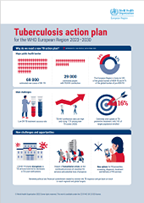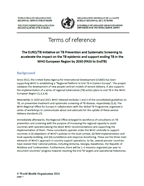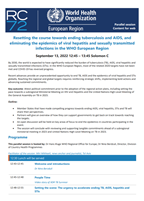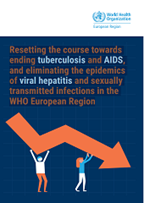Tuberculosis
Tuberculosis (TB) is a contagious airborne disease caused mainly by Mycobacterium tuberculosis. It most often affects the lungs and it spreads through the air when people with pulmonary TB cough, sneeze or spit. A person only needs to inhale a few germs to become infected.
Socioeconomic factors like poverty, inequality, food insecurity and inadequate living and working conditions can increase the likelihood of an infected person developing TB, exacerbate the risk of disease progression and hinder effective treatment. Those with compromised immune systems, such as people living with HIV, malnutrition, diabetes or people with substance use disorders, have a higher risk of falling ill with TB. With timely diagnosis and appropriate treatment, further spread of the disease can be prevented.
In the WHO European Region, over 170 000 new episodes of TB were reported in 2023. While the Region accounts for only 2.1% of the global TB burden, it bears a significant share of drug-resistant TB (DR-TB), with 21% of global multidrug-resistant TB (MDR-TB) cases and 37% of pre-extensively DR-TB cases. Despite the fastest global decline in TB deaths (38% reduction), the Region remains off track to achieve the 75% reduction target by 2025.
The WHO Regional Office for Europe leads the fight against TB in the Region by focusing on:
- prevention and systematic screening
- early diagnosis
- improved treatment, particularly for DR-TB.
Accelerating progress towards TB elimination
WHO aims to accelerate progress towards TB elimination by helping countries to:
- strengthen their health systems;
- ensure that everyone has access to quality integrated people-centred care, leaving no one behind;
- focus on helping groups of people most at risk; and
- bring different parts of society together to fight TB.
However, challenges such as declining international funding and geopolitical instability threaten these efforts, making stronger national commitments and multisectoral collaborative and coordinated actions more critical than ever.
Plan for action
Current TB response efforts in the Region are guided by the Tuberculosis action plan for the WHO European Region 2023–2030 – the main strategic and guiding regional-level document for accelerated actions to end TB. The plan, along with its monitoring and evaluation framework , outlines the vision and strategic actions for the regional TB response. It has been crucial in aligning national strategies with WHO guidelines and policies.
At the global level, WHO supports the implementation of the End TB Strategy, which outlines the vision, goal, targets and milestones for eliminating TB and includes key indicators to measure progress. WHO works closely with key international and national partners and civil society organizations to help Member States to implement the strategy and eliminate TB.
















